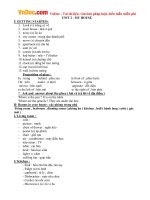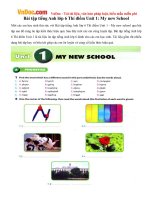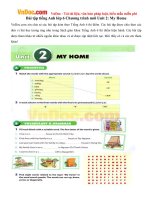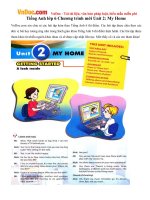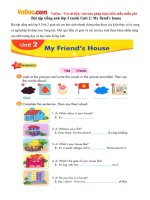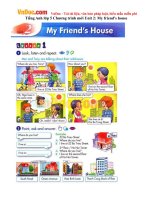- Trang chủ >>
- Văn Mẫu >>
- Văn Bản Mẫu
Unit 2: My new friends
Bạn đang xem bản rút gọn của tài liệu. Xem và tải ngay bản đầy đủ của tài liệu tại đây (129.41 KB, 10 trang )
<span class='text_page_counter'>(1)</span><div class='page_container' data-page=1>
<i>Date of planning: 22/8/2015 </i>
<b>Period 7: UNIT 2: I’M FROM JAPAN</b>
Lesson 1 (1-2)
<i>Date of teaching: </i>
<i>Class/Attendance:</i> 4A: 4B: 4C:
<b>I. Objectives:</b>
<b> By the end of the lesson, students will have been able to ask and answer questions about </b>
where someone is from
<b>II. Language focus:</b>
<b>- Vocabulary: America, Australia, Malaysia, England, Japan, Viet Nam</b>
<b>- Structures: Where are you from? - I’m from…</b>
<b>III. Resources:</b>
<b>- Teacher’s: Pictures, recording</b>
<b>- Students’: Book, notebook</b>
<i><b>IV. Procedure:</b></i>
<b>Activities</b> <b>Interactions</b>
<b>1. Warm up.</b>
- Greet pupils and get their responses, using the words and phrases they
learnt in Unit 1 like Hi/ Hello. Nice to see you again. Then revise the
previous lesson by having them say the chant on page 10 of the Pupils’
Book
- Get Pupils to open their books on page 12 and read the title I’m from
Japan. Check their comprehension by using a world map on which
Japan is circle
<b> 2. Look, listen and repeat.</b>
-Tell pupils that they are going to learn to read a story in which the
characters ask and answer questions about where they are from.
- Have them look at the four pictures to discuss the content in which the
language is used. Ask them questions such as Who is this? Where are
<i>they? And What does he/ she say?</i>
- Play the recording a few times for pupils to listen and repeat. Do
choral and individual repetition, pointing to the characters speaking
- Play the recording again for them to listen and repeat.
<b>3. Point and say</b>
- Whole class
- Whole class
</div>
<span class='text_page_counter'>(2)</span><div class='page_container' data-page=2>
-Tell pupils that they are going to practice asking and answering
questions about where someone is from, using Where are you from?
I’m from…
- Have them look at the pictures to understand how the language is
used in different contexts. Point to the first picture and do the task with
one pupil, using the expressions in the bubbles and the words under the
picture. Ask them to say the phrase chorally and individually.
- Repeat the same procedure with the rest of the pictures.
- Call a few pairs to act out the dialogue in front of the class. Check as a
class and correct pronunciation, if necessary.
<b>* Work in pairs. Imagine you are Hakim/ Tom/ Tony/ Linda/ </b>
<b>Akiko. Introduce yourself and ask where your partner is from.</b>
<b>- Tell pupils that they are going to play the roles of the five characters </b>
and introduce themselves.
- Invite two pupils as Hakim and Akiko to act out this dialogue:
<i>Hakim: Hi. I’m Hakim. I’m from Malaysia. Where are you from?</i>
<i>Akiko; Hi, Hakim. I’m Akiko. I’m from Japan</i>
<b>- Ask pupils to work in pairs.</b>
<b>- Invite a few pairs to perform in front of the class</b>
<i><b>4. Reinforcement:</b></i>
- Repeat the way to ask and answer questions about where someone is
from.
<i><b>5. Homelink:</b></i>
- Prepare the next period.
- Whole class
- Individual,
Pair work
- Whole class
- Whole class
- Pair work
- Whole class
- Whole class
<i>Date of planning: 22/8/2015 </i>
<b>Period 8: UNIT 2: I’M FROM JAPAN</b>
Lesson 1 (3-4-5)
<i>Date of teaching: </i>
<i>Class/Attendance:</i> 4A: 4B: 4C:
<b>I. Objectives:</b>
</div>
<span class='text_page_counter'>(3)</span><div class='page_container' data-page=3>
<b>II. Language focus:</b>
<b>- Vocabulary: America, Australia, Malaysia, England, Japan, Viet Nam</b>
<b>- Structures: Where are you from? - I’m from…</b>
<b>III. Resources:</b>
<b>- Teacher’s: Pictures, recording</b>
<b>- Students’: Book, notebook</b>
<i><b>IV. Procedure:</b></i>
<b>Activities</b> <b>Interactions</b>
<b>1. Warm up.</b>
Play Bingo, using the names of the countries and characters.
<b>2. Listen and tick.</b>
- Have pupils look at the pictures to identify the similarities and
differences. Check understanding
- Play the recording a few times. Ask pupils to listen to the recording
and tick the correct pictures
- Get pupils to swap their answers before you check as a class. Monitor
the activity and offer help, if necessary
<b>Key: 1. b 2. a 3. a </b>
<b>3. Look and write.</b>
-Tell pupils that they are going to fill the gaps with the appropriate
names of countries
- Give a few seconds for pupils to look at the pictures and find
appropriate words to complete the phrases. If necessary, get them to
work in pairs. Go around and offer help, if necessary
- Get pupils to swap their answers before checking as a class. If there is
enough time, call a few pupils to read aloud complete sentences.
<b>Key: 1. Australia 2. Malaysia 3. America 4. Japan</b>
<b>4. Let’s sing.</b>
- Tell pupils that they are going to sing the song Where are you from?
- Have choral and individual repetition of each line of the lyrics. When
pupils are familiar with the tune, give a demonstration of the song and
actions.
- Get groups of pupils to sit face to face and practise singing and doing
- Whole class
- Whole class
- Individual
- Pair work
- Whole class
- Individual/
Pair work
</div>
<span class='text_page_counter'>(4)</span><div class='page_container' data-page=4>
the actions.
- Call a group of six to the front of the class. The group sings the first
two lines in every stanza and the rest of the class sings the last two
lines.
- Have the whole class sing the song to reinforce learning.
<i><b>4. Reinforcement:</b></i>
- Recall the main content.
<i><b>5. Homelink:</b></i>
- Prepare the next period.
- Whole class
- Whole class
- Whole class
<b>WEEK 3</b>
<i>Date of planning: 22/8/2015 </i>
<b>Period 9: UNIT 2: I’M FROM JAPAN</b>
Lesson 2 (1-2-3)
<i>Date of teaching: </i>
<i>Class/Attendance:</i> 4A: 4B: 4C:
<b>I. Objectives:</b>
<b> By the end of the lesson, students will have been able to ask and answer questions about </b>
one’s nationality
<b>II. Language focus:</b>
<b>- Vocabulary: American, Australian, Malaysian, English, Japanese, Vietnamese</b>
<b>- Structures: What nationality are you? - I’m…</b>
<b>III. Resources:</b>
<b>- Teacher’s: Pictures, recording</b>
<b>- Students’: Book, notebook</b>
<i><b>IV. Procedure:</b></i>
<b>Activities</b> <b>Interactions</b>
<b>1. Warm up.</b>
Spend a few minutes revising the previous lesson by calling some pupils
to the front of the class to sing the song Where are you from? Then
explain the word nationality in Vietnamese before introducing the new
lesson.
<b>2. Look, listen and repeat.</b>
-Tell pupils that they are going to learn to read a story in which the
- Whole class
</div>
<span class='text_page_counter'>(5)</span><div class='page_container' data-page=5>
characters ask and answer questions about one’s nationality.
- Have them look at the three pictures to discuss the content in which
the language is used. Ask them questions such as Who is this? What is
<i>she doing? And What does she say?</i>
- Play the recording a few times for pupils to listen and repeat. Do
choral and individual repetition, pointing to the characters speaking.
- Play the recording again for them to listen and repeat.
<b>3. Point and say</b>
-Tell pupils that they are going to practice the question and answer
<i>What nationality are you? - I’m…</i>
- Have them look at the pictures to understand how the language is used
in different contexts. Point to the first picture and get one pupil to ask
<i>What nationality are you? and other to answer I’m Vietnamese . Ask </i>
them to say the phrase chorally and individually. Then tell them to
practice asking and answering in pairs, using the prompts in the
bubbles.
- Repeat the same procedure with the rest of the pictures.
- Call a few pairs to act out the dialogue in front of the class. Check as a
class and correct pronunciation, if necessary.
<b>4. Let’s talk.</b>
- Tell pupils that they are going to practise more with the questions
<i>Where are you from?</i>
<i>What nationality are you? </i>
- Have pupils select the characters they would like to role- play and ask
and answer the three questions in the Pupil’s book in pairs.
<b>- Expand the activity by asking pupils to use their genuine names and </b>
those of the local cities or town.
<i><b>4. Reinforcement:</b></i>
- Repeat the way to ask and answer questions about one’s nationality.
<i><b>5. Homelink:</b></i>
- Prepare the next period.
- Individual
- Whole class
- Whole class
- Individual,
Pair work
- Whole class
- Pair work
- Whole class
</div>
<span class='text_page_counter'>(6)</span><div class='page_container' data-page=6>
<b>Period 10: UNIT 2: I’M FROM JAPAN</b>
Lesson 2 (4-5-6)
<i>Date of teaching: </i>
<i>Class/Attendance:</i> 4A: 4B: 4C:
<b>I. Objectives:</b>
<b> By the end of the lesson, students will have been able to ask and answer questions about </b>
one’s nationality
<b>II. Language focus:</b>
<b>- Vocabulary and structures: Review</b>
<b>III. Resources:</b>
<b>- Teacher’s: Pictures, recording</b>
<b>- Students’: Book, notebook</b>
<i><b>IV. Procedure:</b></i>
<b>Activities</b> <b>Interactions</b>
<b>1. Warm up.</b>
Spend a few minutes revising the previous lesson by having the class
play Tic- Tac- Toe, using the questions: Who is this? Where is she/ he
<i>from? What nationality is he/ she? (She Games in Introduction.)</i>
<b>2. Listen and number</b>
-Tell pupils that they are going to listen to four dialogues and number
the pictures.
- Have them look at the pictures to understand how the language is used
in different contexts. Help them to identify the similarities and
differences by explaining who the characters are, where they are from
and what nationalities they are. Check understanding.
- Play the recording more than once, if necessary. Ask pupils to listen to
the recording and number the pictures. Tell them that they should focus
on who the characters are what they say to each other
- Get pupils to swap their answers before checking as a class. Monitor
the activity and offer help, if necessary
<b>Key: a3 b1 c4 d2</b>
<b>3. Look and write</b>
-Tell pupils that they are going to look at the pictures and fill the gaps,
using the picture cues
- Whole class
- Individual,
- Pair work
</div>
<span class='text_page_counter'>(7)</span><div class='page_container' data-page=7>
- Use the first picture as an example and check comprehension by
asking: Who’s in this picture? Where is she from? What nationality is
<i>she? </i>
- Then guide pupils to fill the gaps before setting a time limit for pupils
to do the task independently. Go around and offer help, if necessary.
- Get pupils to swap their answers before checking as a class.
<b>Key: 2. America, American 3. England, English 4. Japan, Japanese</b>
<b>4. Let’s play.</b>
<b>- Prepare equal numbers of cards with the following words: America, </b>
Australia, Malaysia, England, Japan and Viet Nam. The total number of
cards shoul be equal to or more than the number of pupils. The mix the
cards up and deliver one to every individual in the class. The cards
represent where the pupils are from.
- Tell pupils to choose a country. They should talk to their classmates
and try to find one who is from the country they have chosen.
- When everyone has found a classmate from the country of their
choice, call a few to introduce themshelves and their partners.
<i><b>4. Reinforcement: </b></i>- Recall the main content.
<i><b>5. Homelink: </b></i> Prepare the next period.
- Individual,
- Pair work
- Whole class
- Pair work
- Whole class
<i>Date of planning: 22/8/2015 </i>
<b>Period 11: UNIT 2: I’M FROM JAPAN</b>
Lesson 3 (1-2-3)
<i>Date of teaching: </i>
<i>Class/Attendance:</i> 4A: 4B: 4C:
<b>I. Objectives:</b>
<b> By the end of the lesson, students will have been able to pronounce the sounds of the </b>
letters j and v in the words Japan and Vietnamese respectively
<b>II. Language focus:</b>
<b>- Vocabulary and structures: review</b>
- Phonics: Japan and Vietnamese
<b>III. Resources:</b>
</div>
<span class='text_page_counter'>(8)</span><div class='page_container' data-page=8>
<b>Activities</b> <b>Interactions</b>
<b>1. Warm up.</b>
Spend a few minutes revising the previous lessons by asking six pupils
to point and introduce Mai, Linda, Tony, Peter, Hakim and Akiko, e.g.
This is Mai. She’s from Viet Nam. She’s Vietnamese. Use flashcards of
the characters if possible.
<b>2. Listen and repeat.</b>
-Tell pupils that they are going to practise saying the letters, words and
sentences in the book. Put the phonics letters J and v on the board and
say them a few times. Ask pupils to repeat after you. Prompt pupils to
say the words and sentences, paying attention to the target phonics
letters. Do choral repetition of the words and sentences until pupils feel
confident.
<b>3. Listen and tick. Then write and say aloud.</b>
-Tell pupils that they are going to listen to the recording, tick the correct
words
- Give pupils a few seconds to read the words in silence before playing
the recording.
- Get pupils to swap and check their answers before checking as a class.
Write the correct answers on the board for pupils to copy down into
their notebooks.
- Get pupils to read the words aloud
<b>Key: 1. b 2. a</b>
<b>4. Let’s chant</b>
- Tell pupils that they are going to say the What nationality are you?
Chant. Teach the chant, following the procedure in the Teaching the
<i>unit components in the Introduction. Read each line of the chant and </i>
have pupils repeat it a few times. Show them how to say the chant and
do the actions.
- Get groups of pupils to sit face to face and practise chanting and doing
the actions. Go around to offer help, if necessary.
- Call two groups of six to the front of the class to chant and do the
actions. The rest of the class claps along to the rhythm.
- Whole class
- Whole class
- Whole class
- Individual
- Pair work
- Whole class
- Whole class
</div>
<span class='text_page_counter'>(9)</span><div class='page_container' data-page=9>
<i><b>4. Reinforcement:</b></i>
- Recall the main content.
<i><b>5. Homelink:</b></i>
- Prepare the next period.
- Whole class
- Whole class
<i>Date of planning: 22/8/2015 </i>
<b>Period 12: UNIT 2: I’M FROM JAPAN</b>
Lesson 3 (4-5-6)
<i>Date of teaching: </i>
<i>Class/Attendance:</i> 4A: 4B: 4C:
<b>I. Objectives:</b>
<b> By the end of the lesson, students will have been able to read and write about </b>
one’s country and nationality.
<b>II. Language focus:</b>
<b>- Vocabulary and structures: review</b>
<b>III. Resources:</b>
<b>- Teacher’s: Pictures</b>
<b>- Students’: Book, notebook</b>
<i><b>IV. Procedure:</b></i>
<b>Activities</b> <b>Interactions</b>
<b>1. Warm up.</b>
Spend a few minutes revising the previous lesson by asking the class to
say the chant What nationality are you? Divide the class into two
groups, each group saying one verse of the chant.
<b>2. Read and complete</b>
-Tell pupils that they are going to read the text and complete the table.
- Give a few seconds for pupils to look at the picture. Point to the
picture and ask: Who’s in the picture? Where are they? Where’s he/ she
<i>from? What’s his/ her nationality?</i>
- Tell pupils that the text will tell them more about the children. They
will know which cities they are from.
- Get pupils time to do the task. Go around to offer help, if necessary.
- Get pupils to swap and check their answers before checking as a class.
If there is enough time, do a choral repetition of the text.
- Whole class
- Whole class
</div>
<span class='text_page_counter'>(10)</span><div class='page_container' data-page=10>
<b>Key: </b>
Tony Sydney Australia Australian
Linda London England English
Tom New York America American
<b>3. Let’s write.</b>
- Tell pupils that they are going to write the answers to Quan’s
questions.
- Have them work in pairs to discuss what they are going to write.
Check comprehension and give feedback.
- Give pupils time to do the task. Remind pupils to give genuine facts
about themselves. Go around to offer help, if necessary
- Get pupils to swap and check their answers before checking as a class.
Write the correct answers on the board for pupils to copy down into
their notebooks.
<b>4. Project. </b>
<b> - Tell pupils that they are going to do a project. They should select a </b>
country and make a name card for themselves. They should also draw a
small flag of the country.
- Ask pupils to look at the sample name card in their books, and tell
them to draw a rectangular box of 9cm (width) x 5cm (height) on a card.
Have them copy down the text onto the box and complete the details
before drawing the flag and trimming the card.
- Have a display of all the name cards and select a few pupils to present
theirs orally before removing all the cards to keep in pupils’ portfolios.
<b>Key: Pupils’ own answers</b>
<i><b>4. Reinforcement:</b></i>
- Recall the main content.
<i><b>5. Homelink: </b></i> Prepare the next period.
- Whole class
- Pair work
- Individual
- Pair work
- Whole class
- Individual
</div>
<!--links-->

